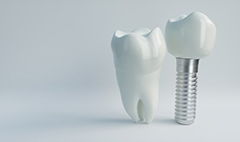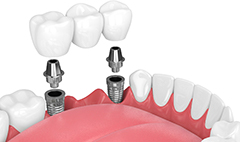
Dental Implants – Wilton Manors, FL
State-of-the-Art Solution for Missing Teeth
Replacing missing teeth has been one of the most important parts of dentistry for generations. Luckily, over the past few decades, dentists around the world have been able to provide a solution that offers a lifetime of strong and beautiful results: dental implants. This treatment goes above and beyond other replacements to improve patients’ oral health and appearance in such a way that it seems like their teeth never went missing in the first place! Thanks to the expertise of our dentists, we can handle the entire treatment process right here at Island City Dental. Please call us today to learn more about dental implants in Wilton Manors!
Why Choose Island City Dental for Dental Implants?
- Entire Dental Implant Treatment Completed Under One Roof
- In-House Prosthodontist & Dental Implant Expert
- Cutting-Edge Dental Technology Ensures Lifelike Results
What Are Dental Implants?

Dental implants go one step further than most tooth replacements by bringing back a lost tooth’s hidden root as well as its visible crown. The implant is a biocompatible post (usually made of titanium) that is surgically placed into the jaw, where it stimulates the surrounding bone to grow and envelop the implant. Then a metal abutment piece and a dental crown (or bridge or denture, in the case of multiple missing teeth) are attached to complete the artificial tooth. This innovative technique has been proven to be the most effective, reliable, and long-lasting way of repairing smiles after tooth loss.
The 4 Step Dental Implant Process

Patients at Island City Dental are in luck when it comes to dental implants because we have two dentists who can both perform the entire procedure from start to finish, including the surgical placement of the new roots. Rather than forcing you to run between different offices to get everything you need, you’ll be able to rebuild your smile in one convenient location while working with the same team you already know and trust.
That said, the process of surgically placing your implants, waiting for them to merge with your jawbone, and designing and placing your restorations can take some time. The entire process may last anywhere from a few months to a year or longer. However, the average dental implant can last for 30+ years with the right care. We think you’ll find that this solution is worth the wait! Read on as we go over the four main steps of the dental implant process.
Initial Dental Implant Consultation

First, you’ll come visit us to ensure that dental implants are a good choice for you. Your Wilton Manors implant dentist will evaluate your medical history, oral health, and jawbone density to determine if you are a good candidate. If necessary, we’ll help you overcome certain barriers like gum disease and low jawbone density with preliminary procedures. Then, we can begin planning out your dental implant treatment.
Dental Implant Surgery

You won’t need to visit an unfamiliar outside specialist to have your dental implants placed. We’re proud to offer start-to-finish convenience so your entire treatment is completed by a dental team you already know and trust.
To place your dental implants, we’ll first numb your mouth and ensure you’re comfortable. Then, we’ll make an incision in your gums to access the jawbone in specific locations. The dental implant is then inserted into the jawbone and then the gums are closed around it. We’ll place a protective cap on the implant to protect it and maintain your gum shape before sending you home to heal.
Dental Implant Osseointegration & Abutment Placement

While you will only need a few days or weeks to feel back to normal after dental implant surgery, your jawbone will need quite some time to heal. Over the coming months, the biocompatible implant will fuse and integrate with the bone tissue in a unique process called osseointegration.
After about 4-6 months of osseointegration, you’ll return to have your abutment placed. This small connector piece is fastened to the top of the dental implant, where it will eventually secure your new teeth in place.
Delivery of Dental Implant Restorations

Finally, once you’ve healed from osseointegration and abutment placement, you’ll return to our office for the last step in your dental implant journey. During this appointment, we’ll place your custom-made crown, bridge, or denture on top of your dental implant or implants. Once we’ve ensured that you’re comfortable and pleased with the results, you’ll be ready to go out and enjoy a complete and confident smile!
Benefits of Dental Implants

By choosing dental implants as your method of tooth replacement, you can expect a great deal of benefits, including:
- Replacement from Root to Crown – Most traditional replacements only bring back the visible part of a tooth called the crown. While this can help with someone’s appearance, they usually prevent a patient from eating whatever they like due to their lack of stability. With implants, however, the new teeth are firmly rooted within the jawbone using small titanium posts, ensuring patients enjoy the same level of function as their real teeth.
- Better Aesthetics – Because implants are built just like natural teeth (with a root-crown structure) and topped with 100% custom-made restorations, they look just like natural teeth as well, making them a seamless addition to any smile.
- Bone Preservation – Bone loss in the jaw is one of the biggest threats after tooth loss, but implant roots can actually stimulate new bone growth in the area and help protect the foundation for the remaining teeth.
- A Lifetime Replacement – With just standard oral hygiene and regular dental visits, an implant can be expected to last for multiple decades, often for the rest of a patient’s life.
Who Dental Implants Can Help

In order for a patient to be a qualified candidate for dental implants, they need good oral health, stable overall health, and enough strong jawbone to support the new roots. Once all of these conditions are met (our team can help you with any that are lacking), we can discuss what kind of restoration would be the best solution for your particular situation:
Missing One Tooth

A dental implant root can be used to support an all-porcelain crown that fits neatly between two healthy teeth. Unlike with a traditional bridge, the surrounding dental structure doesn’t need to be altered at all to make room for this new tooth.
Missing Multiple Teeth

Several implant-supported crowns can be located throughout the mouth to close the gaps left by nonconsecutive missing teeth, and a few roots can even secure a partial denture directly to the jawbone. For patients with more than one tooth missing in a row, implants can also provide support for a dental bridge that replaces up to three teeth simultaneously.
Missing All Teeth

Instead of relying on a removable denture that is constantly slipping and sliding, patients with several missing teeth can get a denture that is anchored to their jawbone using just four to six carefully placed implants. This is much more efficient than replacing each tooth individually. Plus, implant dentures have a secure fit that brings back much more of a patient’s bite strength.
Missing All Teeth with Low Jawbone Density

It can take several months for your mouth to fully heal after getting implants. Normally, this would mean waiting to receive a full denture, but thanks to the modern Teeth in a Day procedure, permanent false teeth can be anchored to your implants right away so that you can eat and smile normally. Additionally, patients with bone loss in their jaws may be candidates for Teeth in a Day even without the need for bone grafting.
Understanding the Cost of Dental Implants

We completely personalize every dental implant treatment we provide here at Island City Dental, which means the cost of dental implants in Wilton Manors can vary from patient to patient depending on their specific needs. We’ll go over all pricing information with you before beginning treatment so that you’ll know exactly what you’ll be expected to pay. We can also talk about how we can use your insurance and financing to make the treatment much more affordable.
Because dental implants last so much longer compared to other replacements, they are actually the most cost-effective option for restoring missing teeth. Instead of having to redo your dental work every five to seven years like with a regular denture or bridge, you’ll be able to rely on your implants for 30+ years with minimal maintenance.
Preliminary Treatments & Dental Implant Surgery

Has your jawbone deteriorated after being without teeth for too long? Do you have gum disease that could end up causing dental implant failure? Are the teeth that have to be replaced still in your mouth? If the answer to any of these questions is yes, then you’ll have to undergo preliminary procedures. While these treatments increase the chances of long-term dental implant success, they’ll also increase your overall dental implant costs.
The dental implant surgery will incur its own cost, and so will the anesthesia you receive. On the bright side, since our team can perform the entire dental implant treatment in-house, you’ll be saved the expense of having to visit a separate specialist.
The Parts of Your Dental Implant

Multiple variables will influence the final cost of your treatment, including:
- The number of implant posts you need to rebuild your smile
- The materials the implants are made from
- The manufacturer who produces the implants
- The type and number of abutments required
Each dental implant case is different, and we can go over which of these variables are right for you (and how they’ll affect your overall treatments costs) during your consultation.
Final Dental Implant Restoration

Dental implants are versatile enough to bring back any number of missing teeth. However, it should come as no surprise that the more teeth you need to replace, the higher it will cost. For example, a dental crown that fits over one implant will cost less than a dental bridge held by two implants, and even less than an implant denture secured by four to eight posts.
Does My Dental Insurance Cover Dental Implants?

More often than not, the answer is no. Dental insurance plans typically consider dental implants to be an elective procedure and do not offer coverage. That said, there may be some exceptions. For example, your insurance may partially cover other aspects of the treatment, such as your restoration. Don’t hesitate to ask our team to look over your benefits!
Making Dental Implants Affordable
As an alternative to insurance, you may want to consider our Island City Dental Membership Plan. For a low monthly fee, you’ll receive a 15% discount on most procedures completed at our practice, plus FREE preventive care like cleanings. We can also help you apply for a flexible, low-interest payment plan through CareCredit to make the cost of your treatment more budget-friendly.
Dental Implant Post-Op Instructions

Recovery after dental implant placement takes time, and it’s important that you adhere to the guidelines provided by our team at Island City Dental to avoid complications. Your investment in a new smile is worth the time and money, but if you want it to heal properly and last as long as possible, you’ll need to make sure that you learn what to do, what not to do, and what you can expect in the days, weeks, and months following your surgery. Should you notice any abnormal symptoms or side effects not provided on this page, you can call us for assistance.
What to Do Directly After Dental Implant Surgery

Immediately following dental implant surgery, you’ll need to make sure that you do not cause the blood clot that is forming to become dislodged. Its presence is necessary for proper healing, so to keep it in place, make sure that you:
- Do not spit or use a straw when drinking a beverage.
- Do not smoke or use tobacco products for at least the first day; however, it’s strongly recommended that you give up the habit altogether.
- Avoid touching your surgical site(s) with your finger or tongue.
Common Side Effects

It is normal to experience some side effects after your procedure. Knowing which ones are expected can help you determine if what you’re feeling or experiencing warrants a visit to our dental office. Should you notice any of the signs listed below, do not be alarmed, as they are a normal part of the recovery process:
- Occasional bleeding for several days. You can reduce the amount by using clean gauze and applying light pressure to the surgical site.
- Some swelling is expected to last for more than one week. Your gums will undergo invasive treatment, so it will take time for inflammation to decrease. Applying a cold compress to the outside of your cheek can help reduce swelling and any discomfort.
- Minimal pain is likely to occur but can be alleviated by taking an over-the-counter pain reliever as directed.
Bleeding, swelling, and discomfort are all temporary symptoms that should go away with time; however, if you notice they are not, or you begin to feel as if something is wrong, call our office.
Diet

A soft food diet is necessary in the days following your implant procedure. Eating hard, crunchy foods can apply too much pressure to these areas, resulting in a dislodged blood clot or added discomfort. Instead, it’s best if you stick to softer foods, like:
- Yogurt
- Mashed potatoes
- Pudding
- Warm soup (not hot)
- Pasta
- Scrambled eggs
- Ice cream
- Oatmeal
Health & Oral Hygiene

Keeping your smile healthy after surgery is essential if you want to avoid a possible infection. This is why we encourage you to brush your teeth as normal the day after your procedure. When doing so, you’ll need to make sure that you pay careful attention when nearing your surgical sites. You can also rinse your mouth with salt water two to three times a day after meals. It’s best to avoid alcohol-based mouthwashes, though.
What to Do After Your New Teeth Are Attached

The surgical placement of your dental implants and the recovery process are the hardest parts of treatment, so once you are fully healed, you can begin to enjoy your new crown, bridge, or denture! You might experience some slight sensitivity in your gums immediately after your restoration is placed; however, over-the-counter pain relievers can help alleviate any discomfort. You should experience no additional bleeding or swelling, so you can start living your best life with a new and improved smile!
Maintaining & Caring for Your Dental Implants

One of the many reasons dental implants are so sought-after is that they can last for 30+ years. Of course, that does require some effort on your end – from brushing and flossing consistently to prioritizing your biannual dental checkups and teeth cleanings. To learn more on the topic of how to care for your new and improved smile, read on!
Make Oral Hygiene a Priority

Since dental implants are crafted from dental materials, like porcelain, they cannot develop cavities. That said, any remaining teeth you have certainly can, and your risk of developing gum disease skyrockets without a solid oral hygiene regimen in place. That’s why it’s so important that you commit to good habits at home, like brushing twice a day with fluoridated toothpaste, flossing every day, and rinsing with an ADA-approved mouthwash consistently.
Eat a Healthy Diet

Remember, what you eat can positively and negatively impact your smile. For that reason, we encourage our patients to avoid hard pretzels, sour candies, taffy, and other foods that are particularly crunchy, sugary, or starchy. Instead, stick to meals that are filled with nutrient-dense foods, like fresh fruits and cooked vegetables. This will help protect your restoration from harm while also reducing your risk of tooth decay and periodontal disease.
Break Bad Habits

Since smoking can delay the healing period, patients are advised to avoid all tobacco products both before and after the dental implant procedure. We also recommend breaking other habits that have the potential to negatively impact your oral health, including biting your nails, drinking alcohol in excess, chewing on ice cubes, and using your teeth to open things. It may take a lot of effort and dedication at first, but it will be well worth it, especially since it can save you from a painful dental injury.
Protect Your Dental Implants

Another step we recommend taking to keep your dental implants in pristine condition is wearing a mouthguard if you participate in sports, including non-contact ones like surfing, rollerblading, or skateboarding. This will dramatically reduce the chances of your dental implant coming loose, chipping, or cracking if you accidentally fall or you’re involved in another sports-related accident.
If you grind or clench your teeth at night, you should also schedule an appointment with us so we can have a custom nightguard made.
Schedule Regular Dental Checkups

Finally, make sure that you visit us for a dental checkup and teeth cleaning twice a year, even if your smile is comprised entirely of dental implants. That way, we can routinely screen for oral cancer, check for warning signs of gum disease, and examine the condition of your restorations. These appointments are also a great opportunity to ask important questions about your oral health, including which products are best for keeping your dental implants in pristine condition.
Dental Implant FAQs

Are you still wondering whether dental implants are the best restorative solution to replace your missing teeth? With decades of research behind this modern procedure, some even published by Dr. Hasan Yap himself, it’s able to offer patients benefits that no other traditional option to replace missing teeth can. When you visit our practice for an initial consultation, Dr. Yap can answer any questions you have and walk you through the process. For now, we’ve collected some common questions we get below for your convenience.
How do I know if I need a bone graft before getting dental implants?
Not every patient requires a bone graft before they can get their dental implants placed. If you’ve been missing teeth for quite a while and have never gotten them replaced, your jawbone may have begun deteriorating. After you get your titanium posts surgically placed, they’ll need to fuse with your jawbone through a process called osseointegration. This allows them to be a stable and strong foundation for your replacement teeth to be placed on. Without a dense enough jawbone, they may not be able to fuse with the bone, posing an increased risk of failure, making a bone graft necessary.
Why do I need a consultation for dental implants?
Dr. Yap requires each patient getting dental implants to schedule an initial consultation to decrease their risk of implant failure. He’ll inspect your oral health and take images of your mouth and facial structure to help him determine whether or not you need any preparatory surgeries or treatments such as gum disease therapy, a tooth extraction, or a bone graft. The initial consultation is also a great time to ask any questions you may have and make sure that the dental implant procedure is a good fit for your lifestyle.
How long does it take to get dental implants?
Every patient’s dental implant procedure is different. There’s no way to know how long the process will take until you’ve consulted with a professional and they’ve been able to address:
- What type of restoration you need
- How many implants need to be placed during surgery
- Whether you need a bone graft, gum disease therapy, or tooth extractions
- Where your implants need to be placed
When you visit our office, we’ll outline a customized treatment plan that will answer some questions you may have, like how long it will take to replace your teeth and how much it will cost. It’s also important to keep in mind that between certain procedures, you’ll need to allow your gums to heal properly to reduce the risk of implant failure. That way, your restorations will be secure, strong, and last for decades.
Is it hard to take care of dental implants?
Dental implants are the closest option to replace missing teeth to the real deal. That means you’ll get to take care of them exactly as you would your natural teeth. With the proper maintenance, you’ll be able to reduce your risk of experiencing complications and help them last for up to 35 years. To get the most out of your new smile, you’ll want to:
- Brush twice each day for two minutes with fluoride toothpaste.
- Floss at least once every day.
- Regularly rinse with antibacterial mouthwash.
- Try avoiding hard, stick, and chewy foods.
- Maintain a nutritious diet to minimize plaque and bacteria buildup.
- Visit Island City Dental for your routine checkups and cleanings.